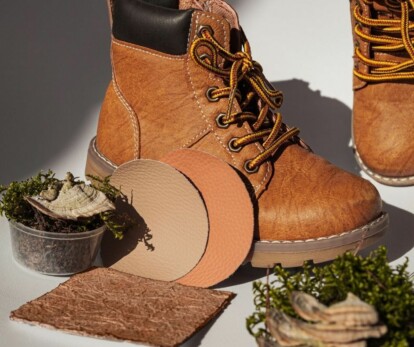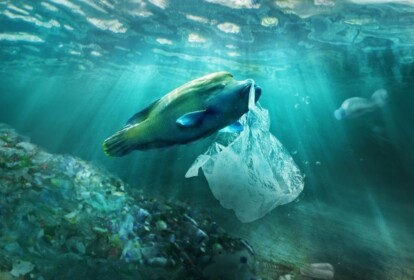Fashioning a better world: Recycled, upcycled and innovative textile materials – part two


A rapidly growing number of us are committing to living a life that’s plastic-free.
This can present huge challenges in today’s society when so many products are made of plastic and even individual perishable items are often wrapped and sealed in the material.
But we have to find a way to reduce and, ultimately, end plastic usage.
The reality is that plastic is made to last forever and yet 40% of all plastic is used just once and then thrown away (91% of all plastic is not recycled!). Discarded into landfills and oceans, it breaks down into smaller and smaller pieces, leaching toxins and attracting other pollutants.
Plastic usage is catastrophic for the environment, humans and other animals.
We have to take individual and collective action to make businesses turn to sustainable, environmentally safe alternatives.
You may not be able to go plastic-free overnight. Plastic is simply too pervasive in our society. Finding plastic-free substitutes for your usual purchases will take time and research.
However, with intention and consistent habit-building, it is possible.
There’s a wonderful global community of people who have embraced the zero waste/zero plastic lifestyle. Look for forums, local groups and zero waste shops that can give you advice about their favourite plastic-free solutions.
Spend five minutes on Google and you’ll also find some fantastic websites, blogs and businesses dedicated to plastic-free living.
Don’t feel you have to throw out all of the plastic objects in your house. Look at what you’ve got and think about how you can re-use or repurpose it to keep it out of the landfills.
Then our advice is to start with some simple plastic-free swaps. With each substitution, you can build a habit that will turn into a way of life.
Below, we’ve put together 10 suggestions for plastic-free swaps that you can make today:
Wherever you are in the world, switching to reusable shopping bags is a powerful first step towards no longer using plastic. Try to have three or four bags with you whenever you go shopping, so you never have to fall back on a single-use carrier bag.
2. Reusable coffee cup/drinking bottle
If you like to grab a coffee on your way to work or buy a new bottle of water each time you go to the gym, try to switch to a reusable coffee cup, flask or drink bottle.
From ceramic or stainless steel to bamboo or cups made recycled paper, you’ll be pleasantly surprised by the variety of designs and options available.
These days, most coffee shops – especially smaller, independent venues – welcome you bringing in your own cups or bottles to fill with your order.
3. Buy drinks in glass bottles
Isn’t it funny how society can go a full circle sometimes? It used to be commonplace to buy soft drinks and juices in glass bottles until plastic took the world by storm.
Fortunately, a growing number of drinks’ companies are returning to glass bottles. There is increasing choice in supermarkets, small shops and cafes.
4. Switch your liquid hand soap to bar soap
Another easy swap is to ditch your usual hand soap in a plastic bottle in favour of a bar of soap with no plastic packaging. There are some truly beautiful handmade soaps on the market these days.
If you prefer liquid soap, it’s worth exploring whether you have a local zero waste shop that sells refills for liquid soaps, detergents and other hygiene or cleaning products. If so, you just need to take your own container in to fill.
5. Cut out frozen ready meals
Shop-bought frozen food, especially ready meals, is often heavily packaged in plastic. If possible, try to batch cook from fresh and then freeze the meals in individual or family-sized portions.
This can be a great way to reduce food waste, cut down your weekly food bill and reuse plastic takeaway containers or Tupperware that you have had in your cupboards for years.
6. Buy from your local grocers or farmers’ market
Take a walk through a supermarket’s fruit and veg aisle and you’re likely to see vast amounts of plastic packaging.
A better alternative is to buy fresh produce from your local grocer or farmers’ market. Fruit and veg are rarely packaged in plastic and will either be sent home with you in paper bags or in your own reusable shopping bag or basket.
In addition, grocers and farmers’ markets tend to stock seasonal produce that has been locally sourced, reducing pollution and supporting local independent suppliers.
7. Prepare packed lunches in reusable containers
While there hasn’t been much call for packed lunches since March 2020, a return to the office or day trips out means that more people will be buying heavily packaged convenience foods to eat on the go.
To avoid this, try to plan and prepare meals away from home in advance, using fresh produce that you carry in reusable lunch boxes or bags. As well as helping you cut out single-use plastic packaging, it should reduce your weekly food bill and offer a healthier option than convenience foods.
8. Compost your food waste
Composting is nature’s recycling system and enables nutrients and organic matter from plants to return to the soil.
By composting your food waste, you can dramatically reduce the amount of bin bags you need to use. In addition, food waste makes up roughly 30% of what we throw away, taking up valuable space in landfill sites and releasing methane, a potent greenhouse gas, into the environment.
Even if you don’t have a garden, it’s possible to compost your food waste and use it for houseplants or even share it with your neighbours or community allotments and food growing schemes.
9. Make your own cleaning products
Many of the cleaning products we use around the home come in single-use plastic containers. They are also made with chemicals that may be harmful to humans, other animals and the environment.
As an alternative, why not start making your own cleaning products using ingredients such as water, vinegar, lemon juice and baking soda?
10. Buy compostable poo bags
If you have a canine companion, cleaning up their poo will be part of your daily routine. The amount of plastic waste caused by their poo bags can quickly mount up.
Even poo bags sold as biodegradable or compostable may not be as environmentally friendly as their manufacturers would have us believe. However, there are some dog poo bags that will break down quickly, as well as ways to keep your dog’s waste out of landfills. This guide from rover.com is a good starting point.
By doing what we can to stop buying or using new plastic products or single-use plastic, the hope is that we can collectively send a message to businesses that they need to invest in ethical alternatives.
The damage to our oceans, wildlife, health and environment due to plastic is truly devastating. Every step to reduce how much plastic we use is vital to making a collective difference.
To what extent do you live plastic-free? Have you checked out the zero-waste businesses listed on Ethical Globe? Do you have any favourite plastic-free products or tips for living without plastic that you can share? We’d love to hear from you!